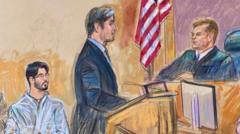**In his inaugural homily as Pope, Leo XIV emphasizes the importance of connecting with the faithful while challenging societal norms.**
**Pope Leo XIV: A New Era Begins for the Catholic Church**

**Pope Leo XIV: A New Era Begins for the Catholic Church**
**The American-born pontiff’s first Mass focuses on the ordinary people and missionary outreach.**
During his first Mass as the leader of the Roman Catholic Church, Pope Leo XIV, who was elected just the day before, expressed a commitment to uplifting the "ordinary people" and dedicated his papacy to addressing societal wounds. In a momentous service held in the Sistine Chapel, the newly appointed pontiff stirred the hearts of the cardinals and attendees alike by advocating for "missionary outreach," a call reminiscent of the legacy left by his predecessor, Pope Francis.
Pope Leo XIV, born Robert Francis Prevost in Chicago, positioned himself against the elite during his homily. With a heartfelt message, he indicated that the complexity of modern society, intertwined with a waning religious faith, has led to unnerving human rights violations. "The lack of faith has contributed to appalling violations of human dignity,” he stated, pinpointing the increasingly skeptical perception of Christianity among various societal sectors, such as media, government, and academia.
In a poignant moment, Pope Leo referenced Jesus' experiences with wealth and power, noting that even the ordinary folk who originally supported Him abandoned Him when their faith was tested. He urged the church to stand by those marginalized and ensure that it doesn’t lose sight of its purpose to spread love and compassion.
Expected to embrace a missionary role, Leo XIV's background stands as a testament to his dedication. With two decades of service in Peru as a missionary before rising through the Vatican ranks to cardinal, he is well-equipped to navigate the complex issues facing a church that is often divided. Experts suggest that he embodies a central figure between various factions within the clergy, drawing upon his rich experiences both in America and abroad.
As an American pope, Leo XIV's election is historic, with his identity merging two cultures and backgrounds. His inaugural address, echoing Pope Francis’ pastoral messages, indicates a continuity in addressing global community needs in response to the crises of faith and morality.
In addition to solidifying his focus on the marginalized, the new pope's challenge will be in determining the church’s direction amid its internal controversies—ranging from the role of women in the church to addressing sexual abuse scandals and balancing doctrinal conservativeness with cultural relevance.
The faithful around the world, particularly in America, will be closely observing how Leo XIV's papacy unfolds in the coming days, particularly as he resonates with the contemporary struggles of society, embodying the core values of compassion and dedication to serving others.
Undoubtedly, the public will eagerly anticipate his statements in the days to come, where he is set to publicly recite the Regina Coeli prayer and engage with journalists for the first time since becoming the 266th pope. The church, with its rich tradition and contemporary challenges, looks toward Pope Leo XIV to guide it through an ever-evolving landscape.
Pope Leo XIV, born Robert Francis Prevost in Chicago, positioned himself against the elite during his homily. With a heartfelt message, he indicated that the complexity of modern society, intertwined with a waning religious faith, has led to unnerving human rights violations. "The lack of faith has contributed to appalling violations of human dignity,” he stated, pinpointing the increasingly skeptical perception of Christianity among various societal sectors, such as media, government, and academia.
In a poignant moment, Pope Leo referenced Jesus' experiences with wealth and power, noting that even the ordinary folk who originally supported Him abandoned Him when their faith was tested. He urged the church to stand by those marginalized and ensure that it doesn’t lose sight of its purpose to spread love and compassion.
Expected to embrace a missionary role, Leo XIV's background stands as a testament to his dedication. With two decades of service in Peru as a missionary before rising through the Vatican ranks to cardinal, he is well-equipped to navigate the complex issues facing a church that is often divided. Experts suggest that he embodies a central figure between various factions within the clergy, drawing upon his rich experiences both in America and abroad.
As an American pope, Leo XIV's election is historic, with his identity merging two cultures and backgrounds. His inaugural address, echoing Pope Francis’ pastoral messages, indicates a continuity in addressing global community needs in response to the crises of faith and morality.
In addition to solidifying his focus on the marginalized, the new pope's challenge will be in determining the church’s direction amid its internal controversies—ranging from the role of women in the church to addressing sexual abuse scandals and balancing doctrinal conservativeness with cultural relevance.
The faithful around the world, particularly in America, will be closely observing how Leo XIV's papacy unfolds in the coming days, particularly as he resonates with the contemporary struggles of society, embodying the core values of compassion and dedication to serving others.
Undoubtedly, the public will eagerly anticipate his statements in the days to come, where he is set to publicly recite the Regina Coeli prayer and engage with journalists for the first time since becoming the 266th pope. The church, with its rich tradition and contemporary challenges, looks toward Pope Leo XIV to guide it through an ever-evolving landscape.


















